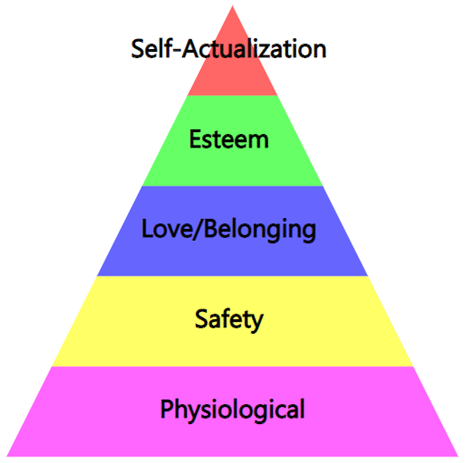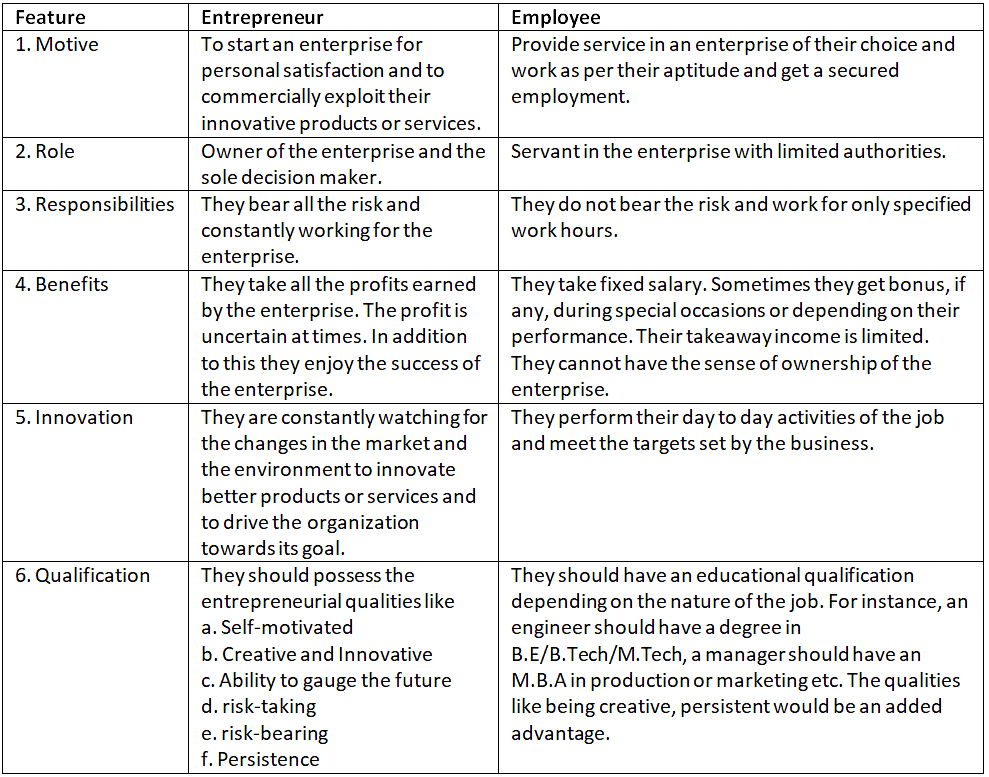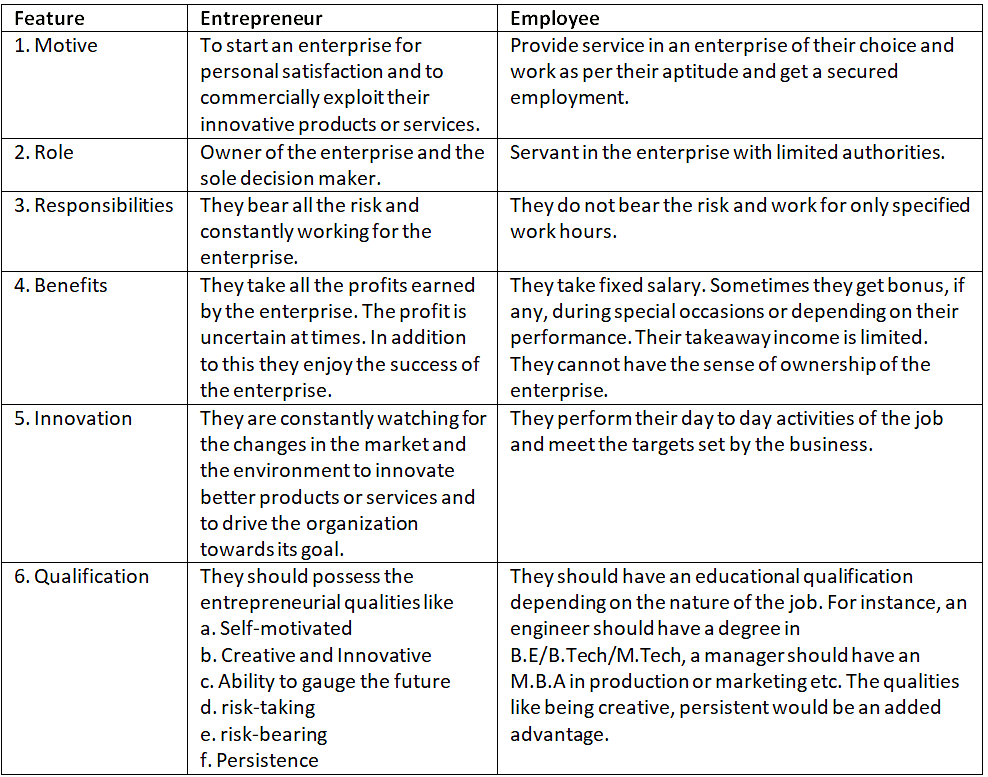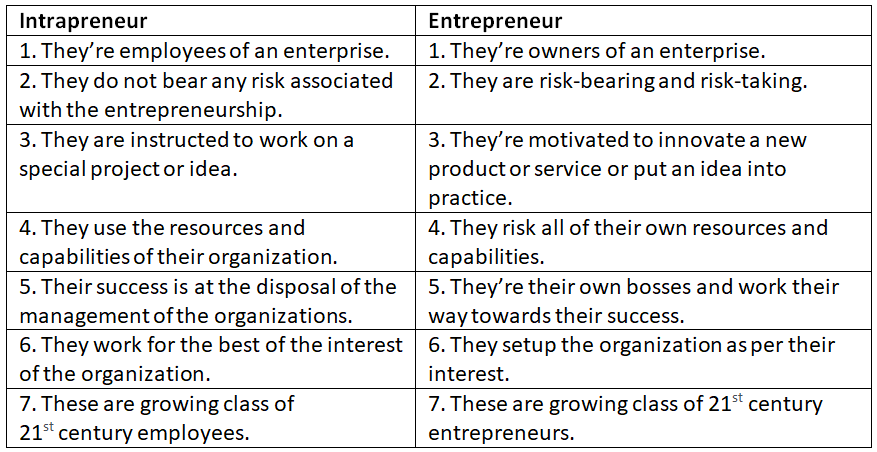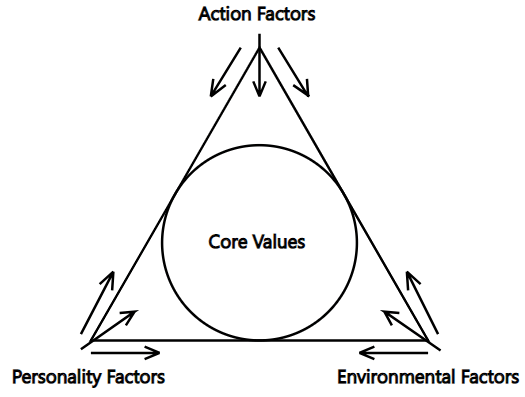Short and Long Question Answers: An Entrepreneur - 2 | Entrepreneurship Class 11 - Commerce PDF Download
Q.4. Answer the following in about 250 words:
(i) Explain any six essential attitudes of an entrepreneur.
Six of the entrepreneurial attitudes of an entrepreneur that an entrepreneur should possess to be a successful entrepreneur are as follows:
- Adopting the change: The entrepreneurs should be ready to adopt the change and move out of their comfort zone. A change is necessary to achieve something. Change can be either in goal, technology, place or employees etc. They should be quick to adopt the change to grab the opportunities associated with the change.
- Courageous: The entrepreneur should have the courage and not afraid of failure. They understand that failures are stepping stones to success and never let the fear of failure hold them from ventures. Even the investors understand this fact. When it comes to a choice, other things being equal, an investor would prefer a person who has failed than a person who has never ventured.
- Decision making in time: The entrepreneurs should be able to take quick decisions. They should be wise enough to decide on what to do. At the same time they should plan the things in an organized way. This would help them to grab an opportunity without missing. Otherwise, there is possibility of losing an opportunity.
- Ethical: They should adopt and follow the business ethics and should be a role model for their employees and other associates. The customer would like to do business with a person who has ethics as compared to a competitor who is not ethical in practice.
- Flexible: They should be flexible enough to adopt the changes in accordance with the changes in the market and technology. Especially for a small scale venture, this flexibility will be an added advantage as adopting the change would be easier, as compared to a large scale enterprise. At the same time they should be rigid enough and stick to the core values and ethical practices.
- Open-minded: They should be open to accept criticism and ready to accept their mistakes (if any). They should win the confidence of the employees and other associates so that the employees do not hesitate to give their honest opinions when they think that their employer has taken a wrong decision, or when they have a better opinion. Entrepreneurs can convey to the employees and other associates that they’re open to suggestions or they can convey this message through a misson statement.
- Passionate: Entrepreneurs should have passion in their work and love what they’re working upon. This will help them to stay unaffected during tough times. This will also help them to become role model for their employees. It is likely that the passion will decrease during tough times. They should take some time off during these times. During this time they can re-kindle the passion by reminding themselves of all the valid reasons about the motive behind starting the enterprise and the advantage of being their own boss.
- Resilient: Every business is likely to go through tough times at sometime or the other. When there is a down fall, they should be resilient enough to rebound back on track. The loss can not be recovered. However, they should consider the setbacks as valuable lessons.
- Self-caring: The entrepreneur plays critical role in moving the organization towards its goal. Their non-availability in the enterprise due to health reasons is likely to put the enterprise in chaos. They should take care of their health first, as they’re the prestigious asset of the enterprise. Everything else is secondary. Being healthy improves their appearance and in turn will bring positive energy and impact on the customers or employees or other associates.
- Self-confident: The entrepreneur should be confident enough about their pursuit or venture and about taking it to its intended goal of success. Their confidence will have a positive impact on the employees, customers and other associates with who they’ve a day to day interaction and thus improves the productivity of the enterprise.
- Self-control: The success and profit shouldn’t make the entrepreneur to be proud or get them into the mode of lavish spending on luxuries. They should keep themselves under control to preserve the profits for the tackling the uncertainties. They should not let the ego come in their way to listen to other peoples ideas and suggestions with patience.
- Trustworthy: They should crate an environment to win the trust of their employees and build a system of integrity in their enterprise. The same is applicable with the customers and other stake-holders. Thus they’ll be able to win the confidence of others which in turn have a positive impact on the productivity and profitability of the enterprise and to win against their competitors.
(ii) Explain Maslow‟s Theory of Motivation.
According to Maslow’s theory of motivation or hierarchy of needs there are five elemental needs based on which every individual is motivated. The following pyramid shows these needs, in a hierarchy.
Moslow’s theory of motivation and needs
- Physiological: They are at the bottom of the hierarchy. Unsatisfied physiological needs like food, water sleep etc., create physiological and physical tension in a person and motivate the person towards satisfying these needs. Once these needs are fulfilled, the person moves towards the next motivating need i.e., Safety.
- Safety: The need for security and shelter becomes the second motivating factor. This includes the safety and security of family, employment, property etc. One would feel the need to live life that is free from fear, tension and they want to be under the protection of order and law. People will put all their efforts so that they get whatever is required to put them under security and protection. Once this need is satisfied the need for the next motivating factor i.e, Love/Belonging drives them.
- Love/Belonging: The third motivating need is the need for love and belonging. Humans by nature are social loving. Getting connected with the relatives and family, making friends in the college or office or in their locality or community will exhibit the effort they put to make them socially belonging. Once these needs are satisfied the next motivating need i.e., Esteem becomes predominant.
- Esteem: Esteem is a typical human desire to be accepted and valued by others. To achieve this they often engage themselves in a hobby or profession that could bring them reputation. Internally all people will have
(a) self-respect
(b) self-esteem
(c) desire for esteem from others
Self-esteem is critical for survival. It contributes majorly to the normal and healthy development of a person. Lack of esteem results from imbalance and could lead to inferiority complex.
In addition to inner esteem factors, people also have a need for external esteem factors like
(a) Appreciation
(b) Attention
(c) Dominance
(d) Fame
(e) Glory
(f) Prestige
(g) Recognition
(h) Reputation
Thus esteem plays a vital role, both internally and externally on human beings. It has a huge impact on their personal growth.- Self-Actualization: This is the highest need of a person. To achieve this they put constant effort to develop themselves. This need motivate them to learn, create, understand and experience their potential.
(iii) Differentiate between an entrepreneur and an employee.
(iv) “Competencies is a set of defined behaviors.” State the types of competencies required by an entrepreneur? Explain.
- Creativity and Innovation: Innovation and creativity are the the most important core values of entrepreneurs. While creativity guide an entrepreneur to dream about creative ideas to improve an existing product or service or solve a problem, innovation guides them to put their ideas into practical use.
An entrepreneur exhibits innovation by:
(a) Being unique and original in their solution.
(b) Contributing critical inputs for a new idea
(c) Develop or Improve the existing products or services
(d) Evaluating the new ideas
(e) Focusing on the solution even when failure occurs
(f) Go for a continuous search for problems in the society (so that they can resolve them)- Enterprise Launching: Entrepreneurs should possess the competency to identify the opportunities and make best use of the resources at their disposal, by launching an enterprise. This trait is what stands them apart from the crowd.
- Enterprise Management: Managing an enterprise is a crucial competency that an entrepreneur should possess. The success of the enterprise depends on the the level of an entrepreneur’s expertise in enterprise management. They should be well acquainted with various functions in the management like
(a) Planning
(b) Organizing
(c) Staffing
(d) Directing
(e) Leadership
(f) Communication
(g) Motivation- Information seeking: The amount of information an organization has at its disposal plays a crucial role in the success of the organization. The entrepreneur should gather the information about changing trends in consumer behaviour, market demand, new technology being introduced, competitor analysis etc. This helps them in decision making process, thus driving the organization towards its goal.
- Initiative: This is one of the basic competency that every entrepreneur should possess. Taking initiative in the starting point in an entrepreneurial process. The entrepreneur should be vigilant of the consumer behaviour, market dynamics, launch of new products to spot an opportunity. Once the opportunity or idea is spotted they should take the initiative to start the entrepreneurial process. Once the entrepreneurial process is started they should increase the pace to establish an enterprise.
- Leadership: Many of the entrepreneurial ventures are unique and new. From the start of the enterprise to the stage where the product or service is introduced into the market, there is lot of uncertainty associated and the entire enterprise has to go through many hurdles and roadblocks. During this, it is essential to guide and motivate the team towards the goal. To achieve this the entrepreneur should possess effective leadership qualities to keep the team focused on the goal of the enterprise.
As a leader, the entrepreneur should exhibit
(a) strong will power
(b) effective business acumen
(c) and communication skills to drive the enterprise towards the goal, during difficult times.- Persistence: Many of the entrepreneurial ventures are unique and new. So, they need a very close watch. Once the product or service is in place, it should be marketed. If the market for the new product does not exist, the entrepreneur should find new ways to create the market, for selling their product or service. During this process, they encounter many hurdles. The entrepreneur should be highly persistent in their efforts and should not give up. Thus persistence is a vital entrepreneurial competency that the entrepreneur should possess.
- Persuasion and Influencing Others: While performing various entrepreneurial functions, the entrepreneur has to deal with various individuals and institutions. They should be able persuade their ideas and influence others so that other people are ready to accept their products are services. To do so they’ve to be well acquainted with the innovative features of their products or services and how their products much better than those prevailing in the market.
- Problem solving: The entrepreneurs start their enterprise to commercialize a new product or service. As the product or service is new and the enterprise is just started, there will be lot of obstacles they would come across in the path of their goal. They should be capable of coming up with a number of different solutions to the problem at hand. They should seek alternate strategies and solutions. They should possess strong problem solving skills to achieve this.
- Quality Performance: They should have a tendency to maintain quality standards in their products or services. They can achieve this by establishing their own standards or adopt the standards set by others. Maintaining high quality standards will help them to win the consumer loyalty.
- Risk taking and risk management: As the area into which the entrepreneur is venturing is new, there lot of uncertainty associated at various levels. This poses risk at various stages of entrepreneurial process. The entrepreneur should be risk taking to move ahead. At the same time, after they’ve started the enterprise and the risk surfaces, they should be capable of managing the risk.
- Systematic Planning: Every enterprise requires the availability of resources like
(a) Time
(b) Funds
(c) Labour
The entrepreneurs gather funds majorly from their personal savings. They put all their efforts and time to establish their enterprise. Any deviation in the planning of the enterprise’s activities will be disastrous and result in the collapse of their dream. In order to put all of these resources to the optimum use, and to spend them in the right direction, they should prepare a detailed systematic planning. They should strictly implement this systematic planning to drive all of their resources towards the goal.
Q.5. Answer the following in about 75 words:
(i) “The thoughts feelings and tendencies to behave are acquired gradually.” In the light of this statement describe the sources of attitudes.
“The thoughts feelings and tendencies to behave are acquired gradually.” This statement makes much more sense when we consider the various sources through we acquire the attitude.
- Family members: At tender ages, the family member have a strong influence in the formation of attitude. It could be positive or negative.
- Need: Necessity changes our attitude others or objects. For instance, the need to reach the school or office, might change his attitude towards possessing a own vehicle as against the public transportation.
- Group Associations: The groups that we belong to will have a great influence. For instance, if you’re in MPC group in 10+1, you might have positive attitude towards Maths. Being part of a soccer group might lead to development of negative attitude about another sport.
- Influential Others: A friend or a relative might influence you to form a positive attitude towards an object or product or person. For instance, your friend might influence you to develop a positive attitude towards a sport. Your favourite star might influence you (through ad) to develop a positive attitude towards a certain four wheeler.
(ii) “Attitude is not by birth; it is acquired” Explain.
Attitude is our behaviour towards a person, place, object or event, either positively or negatively. We are not exposed to a person or place or object or event when we’re born. It is only after we start growing that we come across these. Thus we can say that one do not possess an attitude by birth.
At tender ages, family members have a great influence in developing an attitude. These attitude will start becoming stronger as we grow.
Coming across various situations and meeting people will start influencing us and we start developing new attitudes. Thus we can say that the development of attitude is a gradual process. From the above discussion, we can come to the conclusion that the attitude is not by birth; it is acquired.
(iii) “Entrepreneurs venture to take risks but some entrepreneurs are very shy and lazy by nature.” Mention the name of such entrepreneurs and explain.
Fabian entrepreneurs are over-cautious and have the following features:
(a) Adopt and follow conventional approaches
(b) Belong to family business
(c) Cautious
(d) Display lazy and shy behaviour
(e) Exhibit resistance to venture or risk (This can be considered as their crucial behaviour)
(f) Firm in their rigid and fundamental approach.
(g) Go for a change only for the fear of failure and loss. (This can also be considered as their crucial behaviour)
These are the entrepreneurs who are the last to adopt the changes in the technology, environment and trend set of consumer behaviour. They put their enterprise at the risk of losing the business.
(iv) “Innovation and creativity both are interrelated” Explain.
Innovation and creativity are the the most important core values of entrepreneurs. While creativity guide an entrepreneur to dream about creative ideas to improve an existing product or service or solve a problem, innovation guides them to put their ideas into practical use. Thus without creativity there is no innovation and just dreaming of a creative product or service is not sufficient to start an enterprise. Thus we can say that both creativity and innovation are interdependent.
(v) “We can appoint an employee but not an entrepreneur.” Describe difference between an employee and an entrepreneur in the light of this statement.
(vi) Differentiate between an Intrapreneur and Entrepreneur.
(vii) Explain the following Entrepreneurial Competencies:
(a) Persistence
(b) Leadership
(c) Systematic planning
(a) Many of the entrepreneurial ventures are unique and new. So, they need a very close watch. Once the product or service is in place, it should be marketed. If the market for the new product does not exist, the entrepreneur should find new ways to create the market, for selling their product or service. During this process, they encounter many hurdles. The entrepreneur should be highly persistent in their efforts and should not give up. Thus persistence is a vital entrepreneurial competency that the entrepreneur should possess.
(b) Many of the entrepreneurial ventures are unique and new. From the start of the enterprise to the stage where the product or service is introduced into the market, there is lot of uncertainty associated and the entire enterprise has to go through many hurdles and roadblocks. During this, it is essential to guide and motivate the team towards the goal. To achieve this the entrepreneur should possess effective leadership qualities to keep the team focused on the goal of the enterprise.
As a leader, the entrepreneur should exhibit:
- strong will power
- effective business acumen
- and communication skills
to drive the enterprise towards the goal, during difficult times.
(c) Every enterprise requires the availability of resources like
- Time
- Funds
- Labour
The entrepreneurs gather funds majorly from their personal savings. They put all their efforts and time to establish their enterprise. Any deviation in the planning of the enterprise’s activities will be disastrous and result in the collapse of their dream. In order to put all of these resources to the optimum use, and to spend them in the right direction, they should prepare a detailed systematic planning. They should strictly implement this systematic planning to drive all of their resources towards the goal.
(viii) Why is systematic planning a must for an Entrepreneur?
Every enterprise requires the availability of resources like
- Time
- Funds
- Labour
The entrepreneurs gather funds majorly from their personal savings. They put all their efforts and time to establish their enterprise. Any deviation in the planning of the enterprise’s activities will be disastrous and result in the collapse of their dream. In order to put all of these resources to the optimum use, and to spend them in the right direction, they should prepare a detailed systematic planning. They should strictly implement this systematic planning to drive all of their resources towards the goal. Thus systematic planning is a must for an entrepreneur.
(ix) Define Business Ethics? Why is it important to an entrepreneur.
While conducting business, the enterprise should guard itself from potentially controversial issues such as
- Aversion from corporate social responsibility
- Bribery
- Corporate Governance
- Discrimination
- Exploitation by insider trading
- Fiduciary responsibilities
The study of proper business policies and practices related to the above controversial issues is know as ‘Business ethics’. Business ethics are often guided by law. Sometimes they provide the basic framework that business choose in order to gain public acceptance.
The entrepreneur, while doing the business, interact with the social environment. The entrepreneur’s success purely depends on how the external environment perceives his idea. Any sort of non-adherence to business ethics is likely to put them on the verge of fatality. The should adopt what is termed as ‘Social Entrepreneurship’, ‘Corporate social responsibility’, ‘Social corporate entrepreneurship’.
Focusing completely on the business problems is likely to overlook ethical problems. So, they should be cautious. Non-adherence to business ethics has crashed the business giants like Enron, WorldCom, Anderson etc. So, it is essential for the entrepreneur to adhere to ‘Business ethics’ for the success of the enterprise.
Once the business is successful, few of the ethical standards that help the entrepreneur to retain their success are
- Appropriate measures to maintain quality and quantity standards
- Bearing the environmental responsibilities
- Conforming to the labour laws.
- Discouraging the child labour
- Efficacious usage of the natural resources
(x) Explain types of entrepreneurs on the basis of use of technology.
Depending on the use of technology entrepreneurs are classified as:
- Technical entrepreneurs: These entrepreneurs use their
(a) Knowledge
(b) Specialization
(c) Skill
to develop new or improved products or services. They are technology oriented. Usually they pay more attention production rather than marketing.- Non-Technical entrepreneurs: They focus on innovative marketing and distribution strategies to expand their business. They usually do not pay much attention to the technical details of the product or service.
(xi) Explain types of entrepreneurs on the basis of motivation.
Based on the motivation, the entrepreneurs are segregated as:
- Spontaneous: They are self-motivated and also known as natural entrepreneurs. They undertake entrepreneurship for personal satisfaction in work, ego or status. They are highly creative.
- Induced: These entrepreneurs undertake entrepreneurship to grab the opportunities that come their way like government’s support for prospective entrepreneurs etc. Some times, the circumstances like unemployment or not satisfied by their current job will also force them to adopt entrepreneurship.
- Motivated: These entrepreneurs are highly ambitious and are motivated by their desire to put their talent or skill into practical use. They adopt the entrepreneurship as they’re confident of their idea turning into a successful venture. They’re further motivated when their innovative product or service is adopted by the market and bring them profits.
(xii) What are the entrepreneurial values? Show by diagram. Draw the diagram depicting the entrepreneurial values.
(xiii) “Human beings require respect in the society.” Explain the esteem needs in the Maslow – Hierarchy of Needs Theory.
According to The Maslow – Hierarchy of Needs Theory, esteem is a typical human desire to be accepted and valued by others. To achieve this they often engage themselves in a hobby or profession that could bring them reputation.
Internally all people will have:
- self-respect
- self-esteem
- desire for esteem from others
Self-esteem is critical for survival. It contributes majorly to the normal and healthy development of a person. Lack of esteem results from imbalance and could lead to inferiority complex.
In addition to inner esteem factors, people also have a need for external esteem factors like:
- Appreciation
- Attention
- Dominance
- Fame
- Glory
- Prestige
- Recognition
- Reputation
Thus esteem plays a vital role, both internally and externally on human beings. It has a huge impact on their personal growth.
(xiv) How competency in creativity and innovation helps an entrepreneur meet the challenges of a situation?
The competency in creativity and innovation helps an entrepreneur meet the challenges of a situation as specified below:
- Few individuals have creativity and innovation as a basic characteristic. This help them to achieve their goal.
- In certain cases, they may not have new and creative ideas to introduce a new product or service. But they use creative ideas and innovate the existing products or services(make them), to meet the challenges of a situation.
- Thus, the competency ‘Creativity and Innovation’ helps the entrepreneurs to create wealth with very small effort.
- This also brings them numerous opportunities, as they do not have to innovate a new product or service right from scratch. They just have to use their creativity and innovation to improve upon the existing product or service, to ease out any challenges.
(xv) Do you think Intrapreneur is necessary for an organisation? Support your answer with strong reasons.
Yes, I think that the intrapreneur is necessary for an orgaganisation because supporting an intrapreneur helps the organisation get the following benefits
- Intrapreneurs have entrepreneurial competencies in them. Thus the organization is assured that the new special projects or ideas get the due attention.
- Intrapreneurs work on a win-win situation. Thus the organization is guaranteed of best output.
- The organization gets new opportunities (the intrapreneur’s ideas) to capitalize.
- By supporting and encouraging the intrapreneurs, they will be able to retain highly talented and motivated employees. Otherwise, they quit the job and join a competitor. Sometimes they themselves become competitors by starting a new enterprise.
- With their entrepreneurial thoughts, the intrapreneurs are always thinking of better products or services. This helps the organization to keep pace with the competing markets.
|
37 videos|52 docs|15 tests
|

